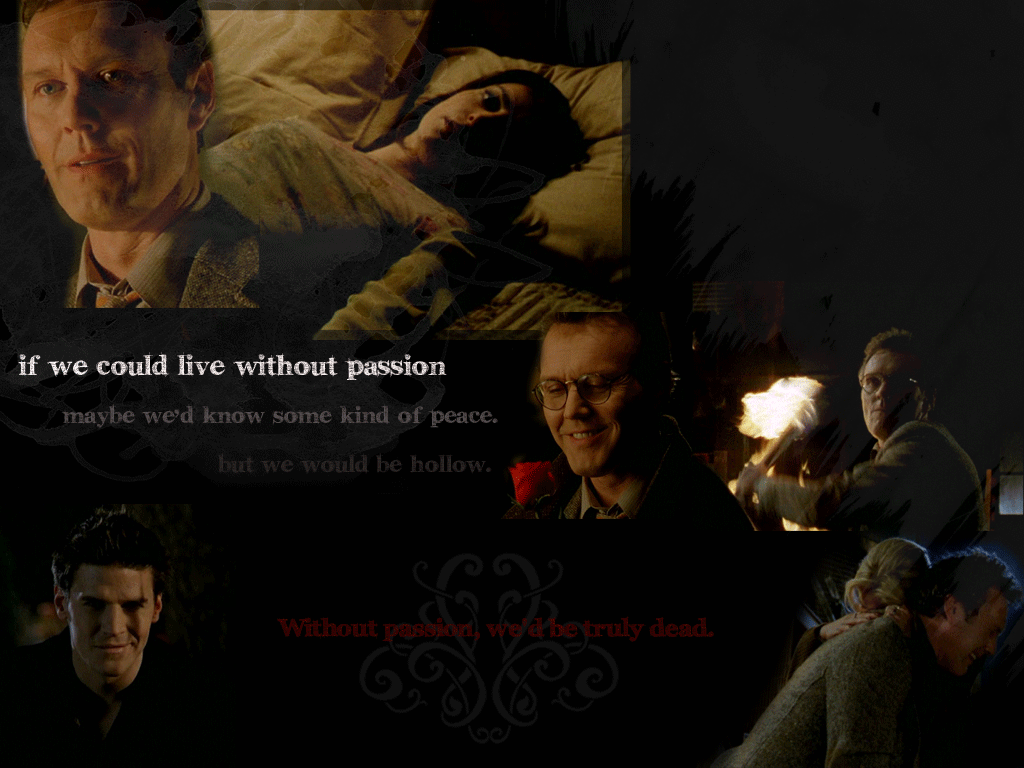How do you pick the best episodes of your favorite television? I’m sure it’s like picking your favorite child (I assume…not a parent yet) but I went through the daunting task of picking the ten best episodes of Buffy the Vampire Slayer and with seven seasons and 144 episodes, there are many highlights. I may look back on this list a year from now and want to change but as it stands, these are the ten episodes I tend to revisit the most in honor of the show’s 20th anniversary:

10. Prophecy Girl (Season 1, Episode 12, Original Airdate: June 2, 1997)- I’ll let this be known now that this is the only season one episode to make the list. Don’t get me wrong, I love season one but since the show was a midseason replacement back in 1997, the first season was more of a monster of the week type series but this episode, which served as the season finale, touches on a few serialized moments from the first season and sets the tone for the show truly hitting its stride in season 2. In the episode, written and directed by series creator Joss Whedon, Giles finds a prophecy that states Buffy will die at the hands of The Master (Mark Metcalf), the Big Bad of season one. When she finds out, Buffy breaks down in the most real and vulnerable moment of the show’s first season, deciding instead to renounce her calling as Slayer and telling him, “I’m sixteen years old. I don’t wanna die.” In the end Buffy does rise to the occasion and faces The Master and while she does technically die, she is later revived and puts The Master in his place. This is an episode that you can tell is written and directed by the person who conceived the whole idea for the show. The show had some dramatic moments in the previous 11 episodes but he pushes for more, particularly from Sarah Michelle Gellar, and it results in the show really discovering its identity and knowing where it was heading. The series had shot all 12 episodes before the show premiered that March so the finale was written in a way to wrap up the show in case it didn’t get renewed but thankfully the show carried on and the episode was just be beginning of Buffy’s growth as a character.

9. The Wish (Season 3, Episode 9, Original Airdate: December 8, 1998) – Even Buffy the Vampire Slayer has its take on It’s A Wonderful Life and it doesn’t get as brilliant and dark as this stellar episode from season 3. In the episode, written by Marti Noxon, we are introduced to both eventual series regular, Anya (Emma Caulfield), and an alternate universe where Buffy didn’t come to Sunnydale in time to stop the Master from rising, leaving Xander, Willow (Alyson Hannigan), and many other characters to be turned into vampires. By the time Buffy does show up, the town is in chaos and it looks as though the characters may be trapped in this horrible reality forever. The episode is wonderfully dark and expertly directed and while it does have its share of dark humor (vampire Willow is darkly twisted) the episode provides a strong showcase for Charisma Carpenter as Cordelia (she sets the episode in motion by making the wish due to seeing Xander kiss Willow and getting injured in the process) and while you think she carries the whole episode, you get a great shock when she is killed 25 minutes into the episode. The episode proves that even though there has been mishaps that Buffy couldn’t prevent, her presence in Sunnydale prevents the town from succumbing to complete anarchy.

8. Earshot (Season 3, Episode 18, Original Airdate: September 21, 1999) – The history behind Earshot makes it interesting long before you even get to watch it. The episode was aired out of sequence in September of 1999 due to being postponed because of the Columbine High School massacre on April 20, 1999. The massacre occurred a week before the episode was set to air and because it included a scene with a student loading a rifle – apparently for mass murder, but in reality for suicide – the WB substituted a rerun of the episode Bad Girls. The episode was delayed until September 1999, two weeks prior to the season four premiere. In the episode, written by Jane Espenson, Buffy becomes infected with an aspect of one of the demons she kills, which turns out to be telepathy. After she begins hearing the thoughts of others, she is horrified by a malicious voice plotting murder. Eventually, she finds the person who she thinks to be the killer, an unpopular student named Jonathan Levinson (Danny Strong), but realizes he has come up to the clock tower to kill himself. Buffy tells him he thinks that everyone is ignoring his pain, but after she heard thoughts for several days, she assures him everyone is just too preoccupied with their own pain to notice. “It looks quiet down there,” she says “It’s not. It’s deafening.” The show has always been known for using its genre elements as metaphors for real life struggles and this episode is a strong example of that. This could’ve easily been an episode that slid into preachy territory but Buffy was always good at finding the right balance and it consistently knew how to speak to its audience while entertaining them along the way.

7.Who Are You (Season 4, Episode 16, Original Airdate: February 29, 2000) – Buffy the Vampire Slayer goes Freaky Friday and the end result is solid character study for both Buffy and Faith (Eliza Dushku), who was introduced previously in season 3. In the previous episode “This Year’s Girl,” Faith, another Slayer who turned to the dark side, wakes from a coma and goes after Buffy, eventually using a device she obtained that switches their bodies. “Who Are You” provides the conclusion to this plot line, in which Buffy is played by Dushku and Faith is played by Gellar. The episode is a solid showcase for both Sarah Michelle Gellar and Eliza Dushku who do an expert job imitating each other. I was particularly stirred by Faith (in Buffy’s body) having sex with Riley (Marc Blucas), Buffy’s boyfriend at the time, and her being moved by him wanting to make love to her and rejecting her more aggressive advances. Faith was always troubled but this was the start of her growth that would continue on the spinoff Angel and her return to be one of the good guys in season 7 of Buffy. The episode, written and directed by series creator Joss Whedon, has some of the best dialogue of the series and one of the show’s best conclusions. At the episode’s climax, Faith and Buffy fight in a church, and when Faith begins to hit Buffy, she cries out, “You’re nothing! Disgusting! You’re nothing!” at her own image, which becomes a pivotal moment in the lives of both Slayers.

6. Hush (Season 4, Episode 10, Original Airdate: December 14, 1999) – Hush represents Joss Whedon at his very best as a riter and director. This is an episode that is scary, funny and a poignant take on issues we sometimes have with communication. In the episode, a group of fairytale ghouls named “The Gentlemen” come to town and steal everyone’s voices, leaving them unable to scream when The Gentlemen cut out their hearts. Buffy and her friends must communicate with one another silently as they try to discover why no one can speak and find whoever is murdering the townspeople. They must also find ways to express their feelings about each other and keep some semblance of control as the town descends into chaos. Oddly enough, this is the only episode of the series to receive an Emmy nomination for Outstanding Writing for a Drama Series even though there is only about 17 minutes of dialogue in the 44 minute episode. Whedon wrote the episode in response to critics saying the dialogue was the best thing about the show and it proved that the series was strong on all fronts. The episode addresses the limits and assets of language and communication and the disruption to society when communication breaks down. It’s a brilliant piece of television is probably among the best hours of programming to air on network TV due to how creative the episode actually is.

5. Innocence (Season 2, Episode 14, Original Airdate: January 20, 1998) – All the episodes that aired before this one during season 2, followed the progression of the love story between Buffy and Angel (David Boreanaz). They defied the odds despite her being The Slayer and him being a vampire (he was cursed with a soul as punishment for all the bad he did as a vampire so he would constantly be tormented by the chaos he caused). Before this episode Angel has been good guy and the only hints we had about his past were through other characters referencing how bad he once was. The episode served as a two part episode that began with an episode called “Surprise.” We learn that if Angel has a moment of true happiness he will lose his soul and revert back to being Angelus, the evil vampire he once was. That moment of happiness happens at the end of “Surprise” when Buffy and Angel have sex for the first time. This moment of intimacy causes him to lose his soul and sets up the next episode, which is by far one of the most engaging episodes of the show. This is an episode once again written and directed by series creator Joss Whedon and it proves to set the tone of the arc that would play out through the remainder of the season. Buffy has to learn to fight the man she has grown to love and recognize he’s not the person she knew anymore. Whedon loves a good metaphor and he gets a big one in a scene where Buffy comes across Angel (now Angelus) for the first time since they had sex. She’s unaware of his change but he’s cold to her and doesn’t want anything to do with her. Whedon used this as way to speak for some girls in high school who give themselves to guy on a intimate level only to have those guys bail once they have gotten what they want. All the acting is strong but this character change allowed Boreanaz to prove himself as more than a brooding pretty face. He goes dark in the best way and proves to be the true villain of season 2.

4. Passion (Season 2, Episode 17, Original Airdate: February 24, 1998) – This was my first emotional gut punch from this show and it is an episode that has continued to stay with me long after my first viewing in 1998. After Angel reverted back to Angelus, he mostly stalked and teased Buffy and her friends with hints of what he could but this episode was the first time we got to see his full fledged level of brutality. In the episode, written by Ty King, Buffy attempts to protect herself and her close ones from Angelus and his murderous intent as Jenny Calendar (Robia LaMorte) continues to search for a spell to restore his soul. Jenny Calendar was introduced in season one during a couple of episodes but in season 2 she was featured much more as a love interest for Buffy’s watcher, Giles (Anthony Stewart Head). Their relationship was a highlight of season 2 but it was threatened when it was revealed that she was related to the family of gypsies who originally cursed Angel. The fact that she knew what would happen if he achieved one moment of happiness put a rift between her and Giles but she was making moves to make up for it by trying to find a way to restore his soul. She does find a way to do just that but Angelus hunts her down at the high school and breaks her neck. The real evil here is the game he plays with Giles, who was set to meet Jenny for a date. He leaves rose petals and a note, seemingly from Jenny, that lures him upstairs only for Giles to discover her dead body in his bed. This was our first indication that no one is safe on this show. I definitely didn’t see it coming when I first saw the episode so the act was met with genuine shock. This act made the Angelus threat very real and it really raised the bar on how dark the show could go.

3. The Body (Season 5, Episode 16, Original Airdate: February 27, 2001) – Death hasn’t felt more real on the show than it did when Joss Whedon wrote and directed the sudden passing of Buffy’s mother, Joyce Summers. In “The Body,” Buffy is powerless as she comes upon her lifeless mother, who has died of a brain aneurysm and although Buffy and her friends deal with death every week, often in very gruesome and fantastic ways, in this episode they are bewildered by the natural death of Buffy’s mother. The group struggles to comprehend what the loss means to each of them and to the group. Buffy must begin to face her life and her duties as the Slayer without parental support and comfort. The episode is wonderfully haunting but a very hard one to watch. I re-watched it for the purpose of this writing and it’s only the third time I’ve been able to get through it. After my grandmother passed away, this was a particularly difficult episode to sit through but there is no denying the power of the performances and Whedon’s artistic choices behind the camera. The episode was stripped of all music—a regular staple of the Buffy series—and disorienting effects were included to convey the sense of displacement and loss associated with the death of a close family member. For a show that deals with such fantastical elements, it’s jolting to see how well it handles real life death so honestly.

2. Graduation Day Part 1 & 2 (Season 3, Episodes 21 & 22, Original Airdates: May 18, 1999 & July 13, 1999) – You might think I’m cheating by including part one and two of this episode in the number two spot but I have always viewed this two part finale as one giant episode and a perfect example of how to do an epic season finale right. The two part finale was written and directed by Joss Whedon and it’s an impeccably paced, and brilliantly written finale to what is arguably the most even and well-crafted season of the show. The big reason the finale works is because “Graduation Day” was a turning point for the series in so many ways. It was a transition from high school to college, from being one show to two shows (the spinoff Angel started the next season), and from Angel being Buffy’s one true love to the that mythic ex against whom all future boyfriends will be compared. And they blew up the school which is about as epic of a way to end the high school years of the show. You’ll notice that part two’s airdate is way after part one and that was due to real life tragedy. During the time of its airing, the episode caused a great deal of controversy in the media. The Columbine High School massacre, which took place only four weeks before the airing of Part One, was widely blamed on violence in entertainment. The WB Television Network had already pulled the plug on an earlier episode, “Earshot” (which itself was not aired until September), and feared that several scenes in “Graduation Day, Part Two” would provoke high school students to do the same thing, especially those depicting the entire graduating class handling weapons against the Mayor. On May 25, 1999, only two hours before “Graduation Day, Part Two” was due to air, The WB suddenly decided to replace it with a re-run from earlier in the season, “Band Candy”. This sudden move received huge attention in the media and thousands of letters were sent to the network demanding that the season finale be shown. Sarah Michelle Gellar publicly spoke out against the decision and Seth Green agreed that the episode should have been broadcast in its original slot. The WB did not air the episode until July 13, 1999, almost two months after it was originally scheduled; since nearly all US schools end their term in May or June, it was then felt safe. The episode attracted 6.5 million viewers, which was typically high for the WB during summer, and comparable to what the other episodes of the season had received.

1. Becoming: Part 2 (Season 2, Episode 22, Original Airdate: May 19, 1998) – So it all came down to this. After Angel turned to his true nature as Angelus, we had been building to an epic showdown between The Slayer and her for former lover. It was inevitable that it would happen but the episode, once again written and directed by series creator Joss Whedon, throws in so many curveballs that ups the emotional resonance of the episode and finds our heroine at a major crossroads by the end of it. When Angelus and Buffy’s fight finally comes to a head, Buffy has everything stripped from her: her home, her place at Sunnydale High, and her weapon. After Angel taunts her, asking what’s left and proceeding to strike the final blow with his sword, Buffy grabs it between her palms and says, “Me.” It’s such a powerful moment for the character and the show and really defines her strength when faced against great turmoil. The real gut punch comes when Buffy finally beats Angelus back and prepares to kill him, Willow restores his soul using Jenny’s spell. Buffy realizes that he has already begun a ritual to destroy the world, opening a portal that only his death can close. So after telling him to close his eyes and kissing him one last time, Buffy stabs her true love in the heart to save the world and takes the next bus out of town. The finale is more proof that Joss Whedon isn’t afraid to put the show’s fans through gut-wrenching agony but it’s a fitting conclusion to one of the best seasons of the show.





